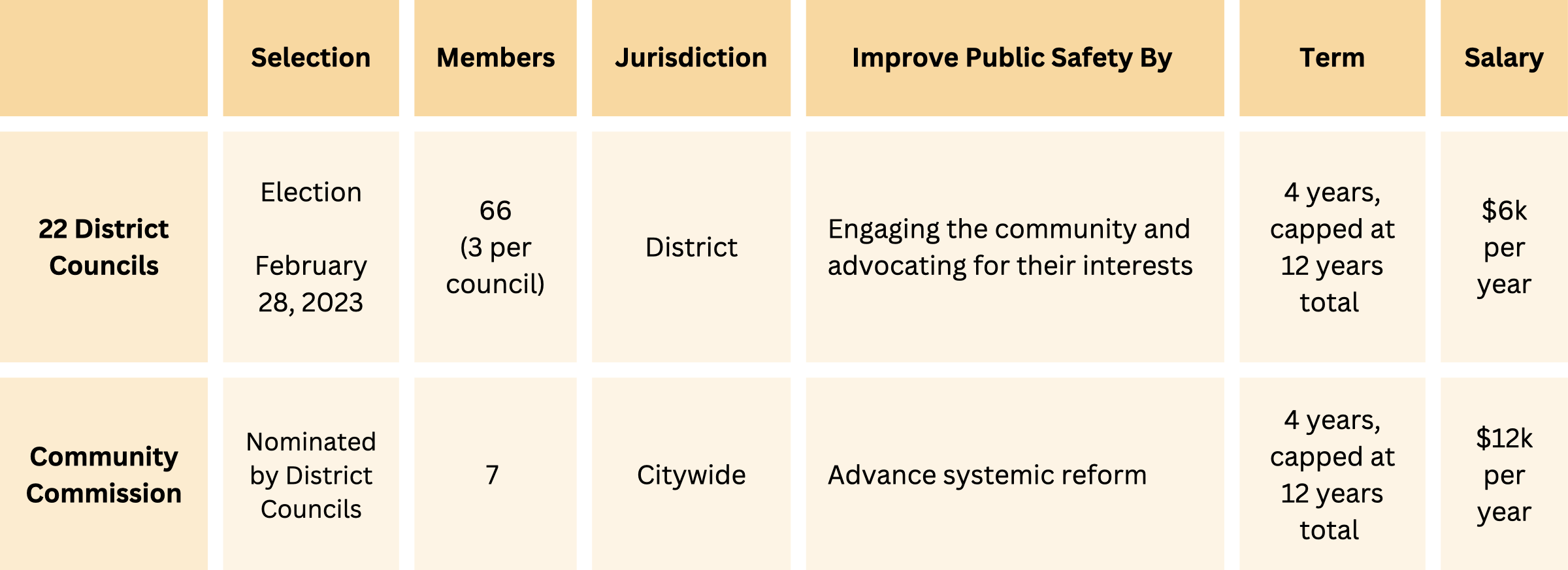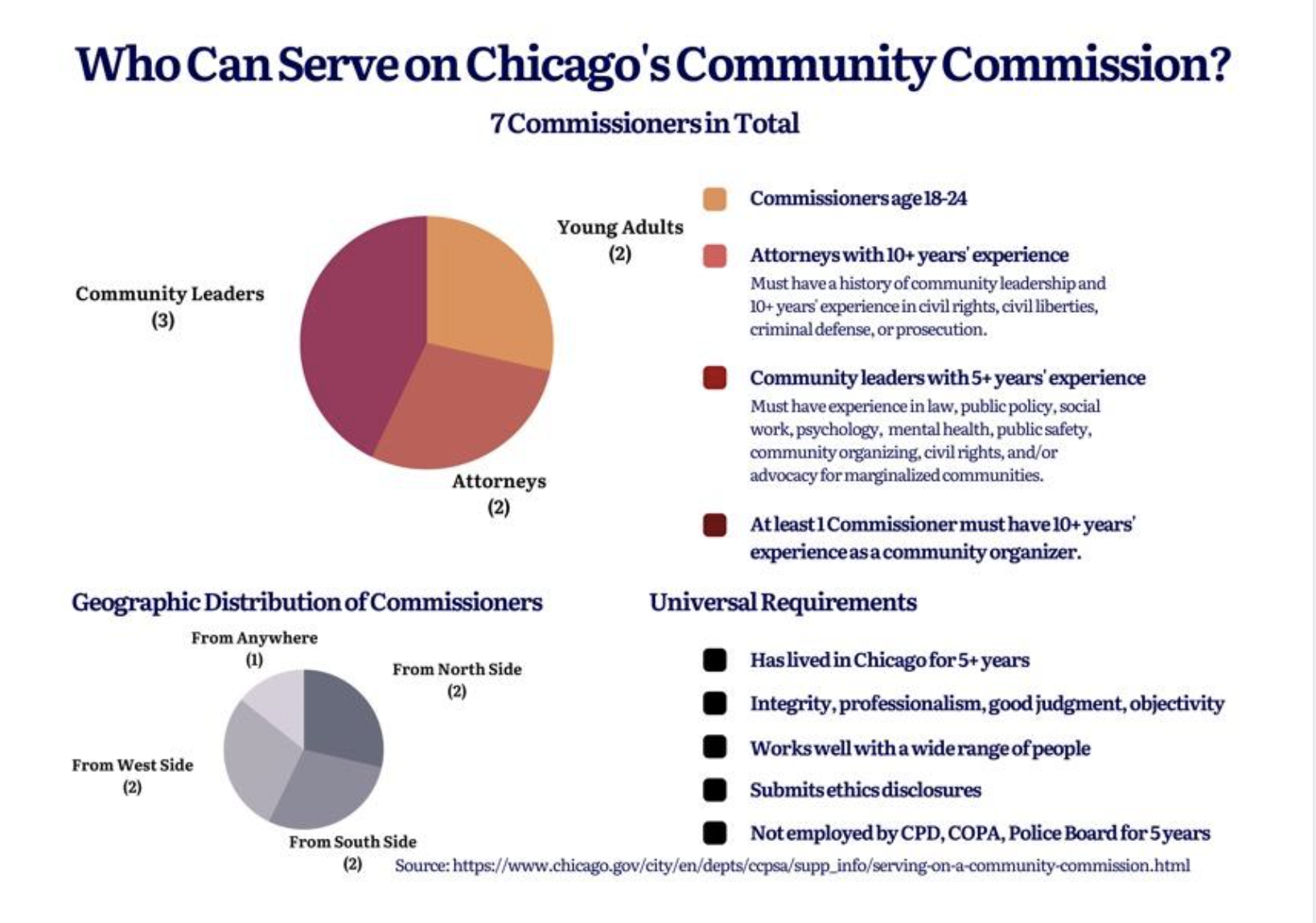Police District Councils and the Community Commission
The Chicago City Council passed a law in July 2021 intended to involve Chicagoans in setting policy for the Chicago Police.
This law establishes an elected District Council (each with 3 members) in each of Chicago’s 22 Police Districts. The District Councils will nominate candidates for the citywide Community Commission for Public Safety and Accountability, also referred to as the Community Commission or CCPSA.
The District Councils and Community Commission are founded on the idea that policing is most effective when it is rooted in a partnership between residents and the police. The goal is the prevention of crime, including crimes committed by police officers. This is different from the Civilian Office of Police Accountability (COPA), which investigates after allegations of misconduct are filed.
On February 28, 2023, Chicagoans elected our first set of 22 District Councils.
District Councils Give Voice to Chicago Neighborhoods
Members of the District Councils are elected from among the district’s residents for the purpose of increasing communication between residents and police.
To build trust, each of the 22 District Councils will host a monthly meeting in their district where residents can give input on public safety—for example, requesting more police presence in their neighborhood or asking for the police to provide updates on ongoing investigations.
District Councils will:
Help their Police District develop and implement new policing initiatives
Act as the eyes and ears of the Community Commission and recommend systemic policy changes
Nominate candidates for the Community Commission for appointment by the mayor
Members serve four-year terms capped at 12 years.
In the February 28, 2023 election, voters elected our first set of 22 District Councils. The District Councils began work in May of 2023.
Each District Council will only be as good as the level of participation by residents in that police district.
For more information on District Councils, read Municipal Code 2-80-070.
Community Commission Oversees Policing
District Councils will report to the seven Community Commissioners, who will serve staggered four-year terms. Learn more about the nomination process on the Community Commission’s website.
The purpose of the Community Commission is to improve public safety by collaborating with Chicago’s police and residents. Like the District Councils, the Community Commission will host monthly public meetings. The Community Commission is also appointing a Non-Citizen Advisory Council to work on issues faced by non-citizens.
The Community Commission’s powers include:
Nominating the chief of the Civilian Office of Police Accountability (COPA), the Police Superintendent, and Police Board members. COPA gathers evidence in cases of alleged misconduct. The Superintendent and Police Board determine whether and how officers accused of misconduct should be disciplined. (2-80-080)
Approving all police policies. Previously, and typical nationally, policy was set by the Police Department without a requirement for public approval. (2-80-110)
Reviewing the police budget before the City Council votes on it. (2-80-050(o))
Increasing transparency. City offices will be required to provide documents and records to the Community Commission within 14 days of request, subject to applicable law. (2-80-030 and 2-80-120)
See the full list of the Community Commission’s responsibilities.
Obstructing the work of the Community Commission is a crime. The Inspector General investigates alleged violations. (2-80-150)
What will not change: Complaints against police officers will continue to be investigated by COPA, the Bureau of Internal Affairs, or the Inspector General. The Police Board and the Superintendent of Police will still have the final say regarding discipline, and the mayor retains full authority to dismiss the Superintendent and the members of the Police Board.
However, the Community Commission can issue a vote of no confidence in the COPA Chief, Superintendent, or a member of the Police Board. This would force a hearing in the City Council Committee on Public Safety. (2-80-90)
The composition of the Community Commission must meet strict requirements, as illustrated in the diagram below.
The Community Commission will start its work by the end of 2023. The meetings of the Interim Community Commission are available on its YouTube Channel.
A report evaluating the work of the District Councils and Community Commission will be published by the Inspector General in 2026.
The information on this page is drawn from the Municipal Code, League of Women Voters Chicago In Focus presentations by Interim Community Commission Executive Director Adam Gross (March 2022, September 2022), and Chicago.gov.


